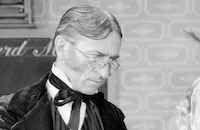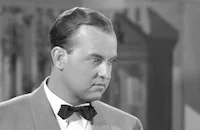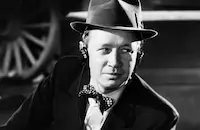Her Lucky Night
Cast & Crew
Edward Lilley
Patty Andrews
Maxene Andrews
Laverne Andrews
Martha O'driscoll
Noah Beery Jr.
Film Details
Technical Specs

Synopsis
In New York City at the Mercury Recording Studio, singing trio Patty, Maxene and Laverne Andrews and their agent Connie wait for their assistant Susie so the sisters can make a recording. Susie comes in dazed by the information she has been given by astrologer Prince de la Mour, who has assured her that she will meet a handsome young man who will take her dancing that very evening. That night after their recording session, the Andrews sisters perform at a local nightclub, where they find Susie in the arms of a handsome young man. Connie, eager to discover her own romantic future, goes to Prince de la Mour, who predicts that the man who will change her future will sit next to her in a movie house. Connie buys two tickets at the nearest theater and drops one ticket from the top of a building, then hurries down to wait in the theater. The ticket lands on tycoon J. L. Wentworth, who goes inside only to have Connie, disappointed at his presence, argue with him. Taken with her spirited manner, Wentworth invites her to his apartment to offer her the job of secretly investigating whether his countrified nephew Larry can manage the family millions. After Connie fails to show up at their office, the concerned Andrews sisters find her at Wentworth's, where Connie, to placate the millionaire's desire for secrecy, introduces them as the new maids. Connie goes to retrieve Larry from the bus station, and the young man immediately becomes embroiled in a series of mishaps. When Larry accidentally hits a police car with his uncle's car, he is arrested and Wentworth must bail him out. Later that evening, the Andrews sisters burn Wentworth's dinner and Larry has a deli deliver their food, but when he cannot pay for it, the deliveryman takes back the meal. Furious, Wentworth demands that Larry return home, but Connie is determined to help Larry and his uncle get along. She goes back to Prince de la Mour, and he advises Larry to stay away from important transactions for two weeks, at which point conditions will again be favorable. Connie arranges to have Wentworth come to the nightclub at the end of the two weeks, and on the big night, Larry discovers his tuxedo has not been completed. The tailor, who is in constant need of vodka, offers to go to the club with him in case of any accidents. While dancing with Connie, various parts of Larry's suit fall off, angering Wentworth. The tailor, plied with vodka by each of the Andrews sisters, tries to keep Larry stitched together but eventually passes out, leaving the sisters to complete the sewing job. Larry finally sits down with his uncle to discuss the family business and Wentworth is grudgingly impressed. Delighted with his success, Larry takes Connie out to the dance floor as his pants slide off.

Director
Edward Lilley
Cast

Patty Andrews

Maxene Andrews

Laverne Andrews

Martha O'driscoll
Noah Beery Jr.

George Barbier
Maurice Cass
Marie Harmon

Olin Howlin
Robert Emmett Keane

Grady Sutton
Edgar Dearing

Eddie Acuff
Rita Gould
Charles Jordan
Billy Newell
Ida Moore
Jack Rice
Buzz Henry
Virginia Sale
Donald Kerr
Eddie Bruce
Perc Launders
Stuart Holmes
Gladys Blake
Charles Hall
Paul Hurst
Mary Mcleod
Nan Brinkley
Dan Quigg
Buddy Wilkerson
Genevieve Bell
Kay York
Warren Jackson
Leslie Denison
Rena Saunders
Crew
Billy Austin
Bernard B. Brown
Clyde Bruckman
Nat King Cole
Louis Da Pron
Jimmy Eaton
Edgar Fairchild
William Fox
Victor A. Gangelin
Russell A. Gausman
John B. Goodman
Charles S. Gould
Emory Horger
Louis Jordan
Paul Landres
Mickey Leader
Frank Loesser
Maxine Manners
Jimmy Mchugh
Irving Mills
Hal Mohr
Terry Shand
Vera West
Warren Wilson
Warren Wilson

Film Details
Technical Specs

Quotes
Trivia
Actor Harold Lloyd sued Universal Pictures for plagiarism over this film. He claimed that much of the story was lifted from several of his early films, which had been written and/or directed by Clyde Bruckman, the writer of this film. The court agreed with Lloyd and awarded him damages of $100,000.
Notes
The working title of the film was Stars Over Manhatten. A September 19, 1946 HR news item indicates that comedian Harold Lloyd sued Univeral Studios for plagiarizing the tuxedo "cutaway" gag he originated in the 1925 silent comedy The Freshman. The outcome of that suit has not been determined.












